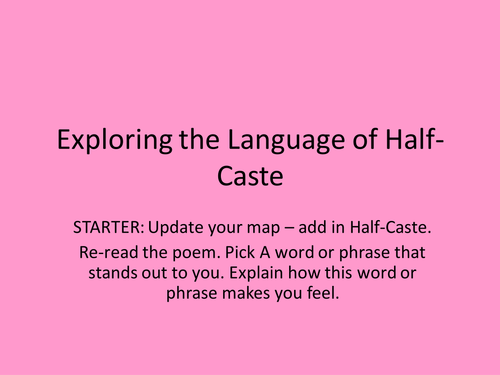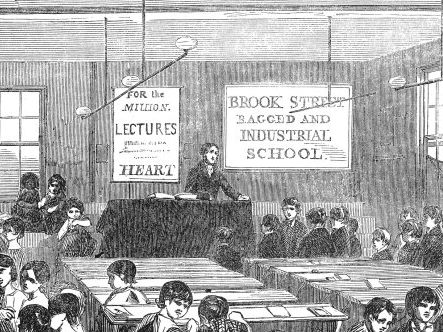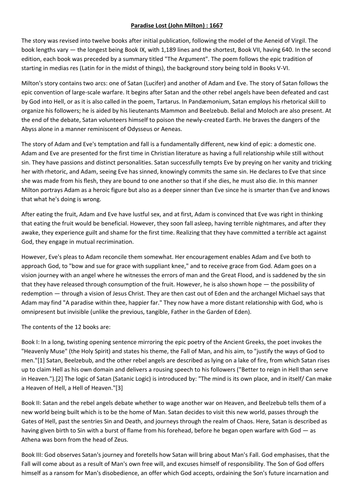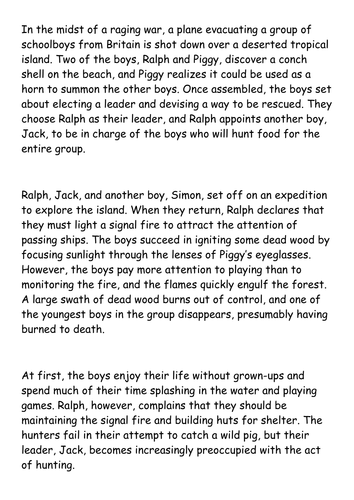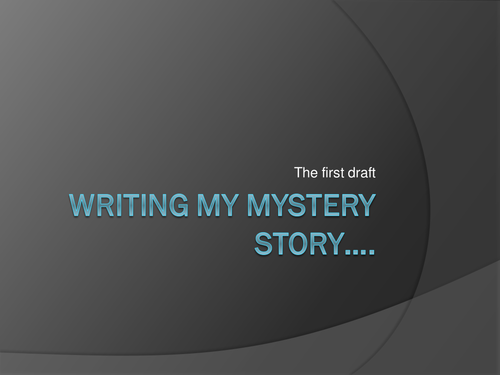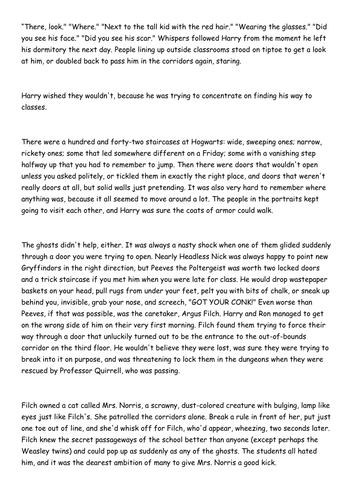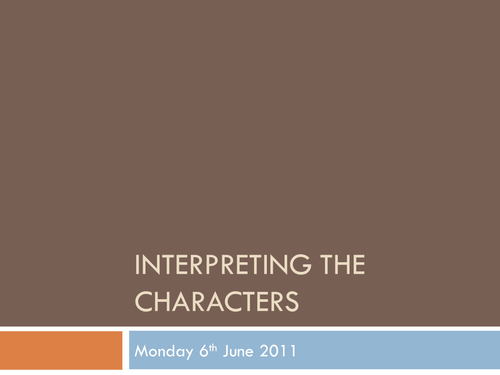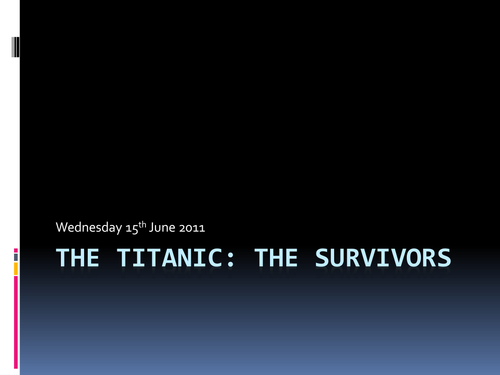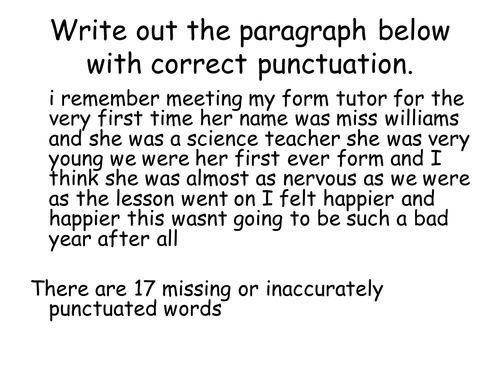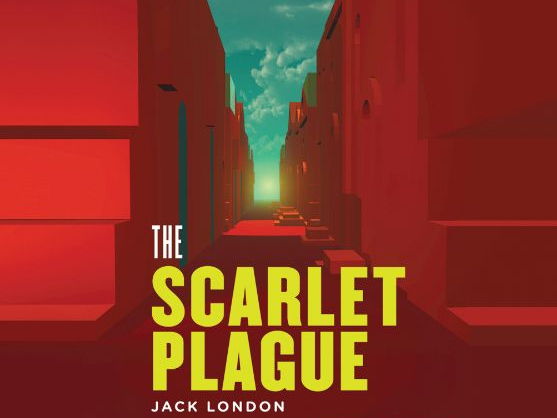
228Uploads
569k+Views
1408k+Downloads
English

Poetry: Cultural Poetry Investigation PART 2
....and here it is. The second part of a KS3 investigation into poetry. It should be noted that I have targetted these lessons specifically at LOWER ABILITY year 7's - this unit is designed to be a little harder.
It should be noted at this point that these resources were created in conjunction with a team of people - i do not take credit for ANY of the word documents in BOTH resources.

English Language Materials (Old Spec)
These are the resources I created for teaching AS English Language - I am certain now that the spec has changed but the skills and powerpoints may be a start point for some. Hope someone out there finds these useful...

Spell Quest - making spelling fun
A summer spent playing word games with my kids lead me to this idea.
The idea is that the students are supplied with a grid of letters. They use these letters to build words which cause damage to a cartoon monster. The bigger the word, the more damage done to the monster.
I’ve made it more and more difficult as the monsters develop - you have to use certain letter types for example.
I plan to give each child one grid per week to complete and have their peers mark it.
So you are completely aware, I have left all of the grids blank apart from on a few. You will need to fill these in yourself. Also, I have left the challenge component blank too. This will allow you to create challenges that reflect the specific types of spellings you are looking at - double damage awarded for homophones for example.
There’s massive scope for differentiation in here too. I’ve included a whole class version of the spelling levels, as well as a photocopy friendly version too.
I have long believed that making school a little more like computer games can be helpful - this is my first attempt at exploring Gamer Theory as I have dubbed it.
Watch this space for more. Have to figure out how to do something similar with the other components of SPAG and Reading now…
ADDITION: I’ve included some completed versions of the pack to give you an idea of what they could look like. Pay attention to the NOTES section of the power points too. These grids have been designed to be used in tandem with the Escape From Kraznir scheme of work.
ADDITION: I’ve also added a new powerpoint that works as a whole class exercise. You don’t need the sheets, just paper and the will to go on…

AQA English Language Paper 2: Death Zone vs London Snow
A powerpoint lesson designed to be taught either AFTER a class has sat AQA English Language Specimen Paper 4, or to be used WHILST a class is sitting the same paper in the form of a mock exam where feedback is given immediately.
In this powerpoint, I refer directly to the model material provided by AQA and provide some feedback that can be given to the students. The idea with the feedback is that the person marking (teacher or student) writes down the letter/number and, when the marked work is returned, the owner of the response can either write the target down in full or highlight it in a printed version.

AQA A-Level English Language and Literature: Othello - Lesson 5-6 (The End and Exam strategy)
Two lessons this time, both very much reliant on the students to do the contributing: hence the reduced price.

AQA English Language Paper 1 Deconstruction: The Silent Land
Similar to a number of other resources I’ve already posted.
Designed to be used after the students have sat the associated AQA English Language Paper 1 GCSE Paper, though with a little tinkering, you could run this as a mock exam itself and then have the students peer/self-assess afterwards.
The powerpoint goes through each of the five questions, placing a firm expectation on the students having a pre-established strategy for completing each task. The students are then encouraged to refine this strategy. Each of the sections contains a break down of the associated source, exploration of the stepped Model Responses provided by AQA, and then provides the students with up to FIVE Case Study responses written by students (containing mistakes and all).
I’ve had a lot of success with these types of powerpoints and they are especially useful for students working in isolation, or as a revision tool.
Hopefully this will be of use to you.

AQA English Language Paper 2 Deconstruction: The Other Side of the Dale vs The Ragged School
I’ve done quite a few of these now, and I always try to improve on the last one. I think this is about as far as I can go with this format. Here’s what you get:
An individual breakdown of each of the exam questions. Each section contains the following:
A breakdown of the AQA related material
A walk-through for Q2, Q3 and Q4
Suggested targets and strategies
5 Case studies using real student responses (Except for Q1. You’ve got 10 for Q5 though)
Real students planning processes laid out for discussion
It’s a big one - you’ve got 60+ slides to work through. In terms of teaching, this works best after you’ve sat the relevant exam. However, it wouldn’t take much tweaking for a mock-style scenario. Also, this is designed to be given to the students so that they can engage with it at home.

Renaissance Poem, Play & Prose: Worksheets
A set of worksheets including comprehension questions and synopsis summaries of a play, prose and a poem. Each sheet has comprehension questions that lead the A level students towards understanding.
Still trying to get my head around this course so feedback would be appreciated as to how useful these resources are.

Lord of the Flies: Stage 1 - Reading (M - H)
Here you will find the reading lessons for my Lord of the Flies SoW for the mid to higher ability (Learning outcomes measured against Levels 4 - 6).
IMPORTANT: Lessons 6 and 7 use sound-clips which I couldn't upload - you will have to find suitable sound effects yourself.
Please feel free to add feedback and any suggestions.

GCSE Literature: Character and Voice
I shall add to this as i create my power points. They will all follow the AQA Working with the Anthology Achieve a C textbook. Hope they prove useful to some.

Murder Mystery: Writing
To be taught following the completion of the speaking and listening side of this unit. A selection of resources geared very specifically towards the creation and improvement of a mystery story.

Creative Writing: Gothic Fiction
Series of power points designed to help students to write their own Gothic Short Story.

Title, Blurb and brief description
A starter activity to get students involved in different types of fiction. You will need to cut out each of the constituent parts, but this is a great starter activity with the kids working together to match them up.

Twelfth Night: Interpreting Characters Powerpoint
A complete powerpoint lesson exploring the way in which students can interpret the characterisation evident in Twelfth Night by William Shakespeare.

Creative Writing: The Titanic
I created these resources whilst on a second school placement during my GTP. The aim was to get a year 9 group to write creatively but familiarize them with GCSE marking criteria (Welsh Board). The information surrounding the Titanic was to provide a stimulus for them to write their own story.

AQA A-Level English Language and Literature: Othello - Lesson 3 (Desdemona)
My third lesson. This is designed to be a lesson where I as the teacher give less and the students give more of their own ideas - the group is reluctant to communicate. As a result, it is less "idea heavy" and far more task focused - you'll get a lot of markable material out of this.

KS3: Survival Reading Assessment
A series of lessons and resources designed for a top set year 8 class. The extracts are a mixture of fiction and non-fiction. The focus was to take a group of year 8 students who are used to using the PEE structure and get them to write a concept focused response. I’ve included the model responses we built as a class, as well as the model response the students were provided.

First Day Feelings
Linked to the Roald Dahl 'Boy' SoW. I used these powerpoints and worksheets to differentiate for a very large middle set year 7 group. Reasonable success - the worksheets allows the top end to focus on their own development, leaving me to focus on those who were really struggling.

AQA English Language Paper 1 Revision lesson: The Scarlet Plague
So my school got a-hold of some exams for purposes of our year 11s sitting mock exams. This is the lesson I am using to teach the little so-and-sos what went wrong and how to fix it. For this lesson to have relevance, you will needed to have had your students sit the actual exam. Saying that, you could probably get away with photocopying the extract and running it as a walking-talking mock (say that's not a bad idea...).
This lesson is simple: it goes through each question in order and identifies some general common errors made in the students' answers, some paraphrased student responses are included as discussion points (just a quick one, when I say that the response comes from an answer that got X amount of marks, I am awarding that mark to a complete answers, not the section I have chosen to show) and finally some specific areas of focus. You have enough for about 4-5 lessons here, depending on how much you focus on the larger questions.
Enjoy.

DAZ 4 ZOE Assessment Pack
Shows lessons building up to a reading assessment looking at RAF 2,3,4 and 5. These lessons are targeted at a top set Year 8 class with levels ranging from 5 - 7.

